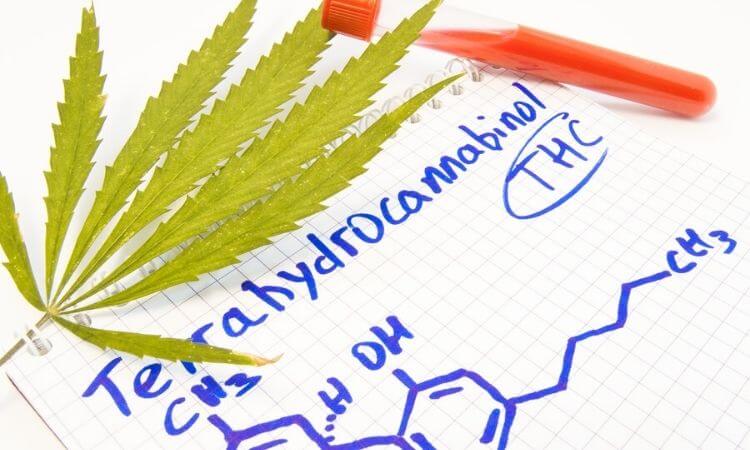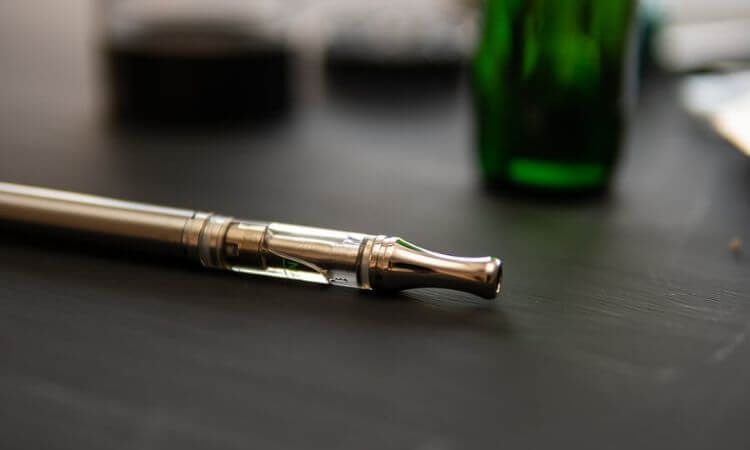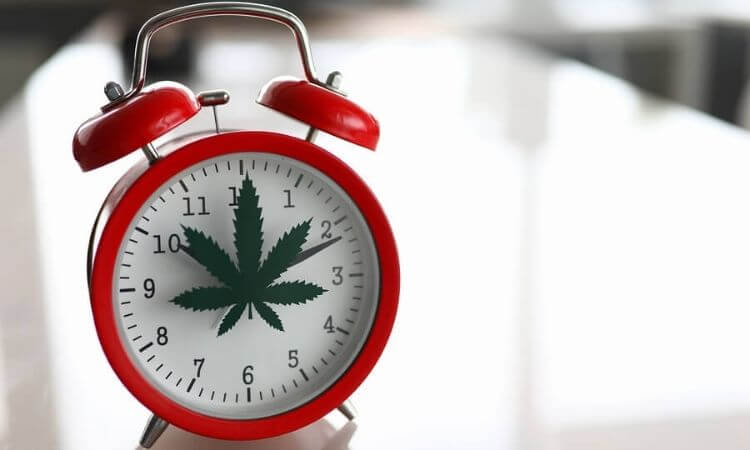
THC (tetrahydrocannabinol), the psychoactive ingredient in marijuana, can be identified in bodily fluids for 1-30 days after last use. As with many other substances, it may be detected in hair follicles for several months.
Upon inhalation, active THC can be detected in the bloodstream in just seconds and in plasma for several hours. According to a 2004 study, the plasma concentration of THC is highest in just 3-8 minutes after inhalation and decreases rapidly with a half-life of only 30 minutes. The study posits that THC can be identified in blood for around five hours, but the THC metabolite THC-COOH has a detection window of up to 25 days.
Moreover, although the active form of THC doesn’t stay in the bloodstream for very long, THC metabolites can still be detected in the body several weeks after use.
Marijuana detection times can vary between individuals, however, and depends on the amount ingested and the frequency in which it’s used. Higher doses and daily use are associated with a more prolonged period of detection. In regular users, THC use can be detected for many months after the last use using a hair follicle test.
Drug Detection Windows
Drug screens check for the presence of THC and its by-products, known as metabolites.
Urine Tests
The Mayo Clinic states that THC can be found in the urine for the following periods after last use:
- Occasional users (who ingest it three times per week or less): three days
- Moderate users (who ingest it a few times per week): 5-7 days
- Long-term users (who ingest daily): 10-15 days
- Heavy, chronic users (more than once per day): more than 30 days
Unlike other water-soluble drug metabolites, THC metabolites attach to fat cells in the body. As a result, it can take a prolonged period for them to be cleared from a person’s system.
Blood Tests
THC can be found in the blood seconds after inhalation and for up to two days. However, in some instances, it’s metabolites have been identified for several days 25 days or longer. Long-term heavy use prolongs the length of time that it can be detected.
For this reason, blood tests are only useful to reveal relatively recent marijuana use. Urine tests are used more often, however, because they are less invasive.
Saliva Testing
Marijuana can be identified in saliva for the following periods after the last use:
- Occasional users: 1-3 days
- Chronic users: 1-29 days
THC can enter the saliva through smoking or smoke exposure. Its metabolites are only present in saliva when it has been smoked or ingested in another way. In areas where marijuana has been legalized, saliva or mouth swab tests may be used by law enforcement for roadside testing.
Hair Follicle Tests
Hair follicle tests can identify marijuana use for up to three months. After use, marijuana reaches hair follicles through small blood vessels. Trace amounts may remain in the hair. Because hair grows about 0.5 inches per month, a 1.5-inch hair sample taken near the scalp can provide a detection window of THC use for the past 90 days.
Metabolization Time and Factors That Influence It

THC is absorbed into the blood after being ingested and some is stored in fatty tissue and organs. It is then processed by the liver, that this results in over 80 metabolites. THC-COOH is inactive and highly fat-soluble, so, as noted, it can remain in the body much longer than active THC itself.
Several factors can affect how long THC and its metabolites stay in a person’s body. These include age, sex, weight, and body mass index. These aren’t associated with marijuana use itself, but rather how each person’s body processes and metabolizes it.
Other factors are related to marijuana itself and how it is normally used. Frequent use and ingesting higher doses will likely prolong the amount of time for THC metabolites to be eliminated from a person’s system. More potent marijuana strains that are particularly high in THC may also stay in the body for a more extended period. Likewise, marijuana that is ingested orally may remain in the body for longer than that which is smoked.
Unfortunately, there isn’t a lot a person can do to expedite this process. Once in the blood, the body requires time to break THC down and excrete it. Exercise and staying hydrated may help, but there is unlikely to be a drastic difference in the detection timeline.
There are many marijuana detox kits available that typically require a person to drink a copious amount of water to dilute urine. These often include vitamin or herbal supplements, such as vitamin B12, to conceal the dilution. In general, these kits are not found to be very reliable.
Time to Experience Effects
The effects of THC may onset rapidly, often within 15-30 minutes after inhalation. When ingested orally, it usually takes longer, perhaps even 1-2 hours after consumption.
Common effects of marijuana use include the following:
- Euphoria or sense of well-being
- Relaxation
- Slowed time perception
- Humorousness
- Talkativeness
- Altered sensory perceptions
Other short-term effects may include the following:
- Impaired focus and concentration
- Increased appetite (the “munchies”)
- Impaired coordination
- Drowsiness
- Restlessness
- Accelerated heart rate
- Confusion
- Paranoia
- Anxiety
- Dry mouth
- Low blood pressure, dizziness
- Feeling faint or fainting
In rare instances, high doses of marijuana can induce hallucinations and delusions. These reactions may also occur in individuals who are predisposed to them, such as those with psychotic disorders.
Ingesting marijuana every day can have other effects on the brain and body. People who do may be at a higher risk of cognitive, learning, and memory impairments, although these are believed to be mostly reversible after cessation of use.
They may also be more likely to have a stroke or develop heart disease and respiratory problems such as lung infections or bronchitis if they commonly smoke. Mood disorders, such as depression or anxiety, may also be more likely to occur.
Timeline for Effects

THC’s short-term effects generally start to wane after 1-3 hours. Some effects, however, such as memory problems or difficulty sleeping, can persist for several days.
Researchers aren’t entirely sure how long the effects of chronic marijuana use can last. Because the Drug Enforcement Administration (DEA) continues to classify marijuana as a Schedule I controlled substance, funding for research is scant. However, it appears these effects may persist for days, weeks, or months after marijuana use has been discontinued. It is possible that, in some cases, consequences may be chronic or even permanent.
Getting Treatment for Marijuana Abuse
Due to the psychoactive chemical THC, marijuana is a substance with a high potential for abuse, albeit with a low potential for dependence and addiction. Although it is a relatively mild drug in terms of effects, use can lead to adverse health consequences, at least in the short-term, and can affect performance at work or school and cause conflict in relationships.
Marijuana’s ability to lead to physical dependence may be up for debate, but the truth is, for many, it can be a tough habit to break. Midwood Addiction Treatment offers comprehensive programs designed to treat all aspects of substance abuse and mental health.
Our services include those clinically-proven to be very useful in the treatment of addiction, including cognitive-behavioral therapy, individual and family counseling, peer support groups, substance abuse education, aftercare planning, and more.
If you or someone you love is struggling to quit using marijuana or other substances, contact us today and find out how we can help!